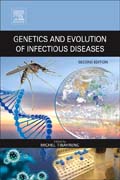
Genetics and Evolution of Infectious Diseases, Second Edition, discusses the constantly evolving field of infectious diseases and their continued impact on the health of populations, especially in resource-limited areas of the world. Students in public health, biomedical professionals, clinicians, public health practitioners, and decisions-makers will find valuable information in this book that is relevant to the control and prevention of neglected and emerging worldwide diseases that are a major cause of global morbidity, disability, and mortality. Although substantial gains have been made in public health interventions for the treatment, prevention, and control of infectious diseases during the last century, in recent decades the world has witnessed a worldwide human immunodeficiency virus (HIV) pandemic, increasing antimicrobial resistance, and the emergence of many new bacterial, fungal, parasitic, and viral pathogens. The economic, social, and political burden of infectious diseases is most evident in developing countries which must confront the dual burden of death and disability due to infectious and chronic illnesses. Takes an integrated approach to infectious diseasesIncludes contributions from leading authoritiesProvides the latest developments in the field of infectious disease INDICE: Introduction: the need for a holistic approach to infectious diseases 1. Molecular epidemiology and species definition of pathogens 2. Virus species 3. Viral evolution 4. Species concept in bacteria 5. Population structure of pathogenic bacteria 6. Evolution and pathogenesis of fungal organisms 7. Clonal evolution 8. Co-evolution between host and pathogen 9. Elucidating human migration by means of their pathogens 10. Phylogenetic analysis of pathogens 11. Evolutionary effects of infectious diseases on humans 12. General human population genetics, major genomic projects and their relevance for biomedical research 13. Pathogen and vector sequencing projects 14. Proteomics and Host-Pathogen Interactions: a bright future? 15. Evolution of antibiotic resistance 16. Mechanisms of antiviral resistance 17. Evolution of resistance to insecticides in disease vectors 18. Genetics of major insect vectors 19. Modern morphometrics of medically important insects 20. Multilocus sequence typing of pathogens 21. Analysis of pathogen evolution using microarrays 22. The bioinformatics revolution and infectious diseases 23. Genomics of infectious diseases and private industry 24. Pharmacogenetics: The a la carte medicine of tomorrow? 25. Experimental recombination in trypanosomes: its relevance for formal genetics and epidemiology 26. Population genetics of Plasmodium falciparum and the challenge of drug Resistance 27. Molecular evolution of Trypanosoma cruzi: a new paradigmal model of basic science? 28. Identification of Mycobacterium tuberculosis populations using microarrays: does it permit routine molecular epidemiology? 29. The evolution and dynamics of methicillin-resistant Staphylococcus aureus: can it be controlled by public health measures? 30. The origins of human immunodeficiency virus and implications for global Epidemics 31. Evolution of SARS coronavirus and the relevance of modern molecular Epidemiology 32. Ecology and evolution of avian influenza: the risk of a major pandemics
- ISBN: 978-0-12-799942-5
- Editorial: Elsevier
- Encuadernacion: Cartoné
- Páginas: 772
- Fecha Publicación: 01/02/2017
- Nº Volúmenes: 1
- Idioma: Inglés
